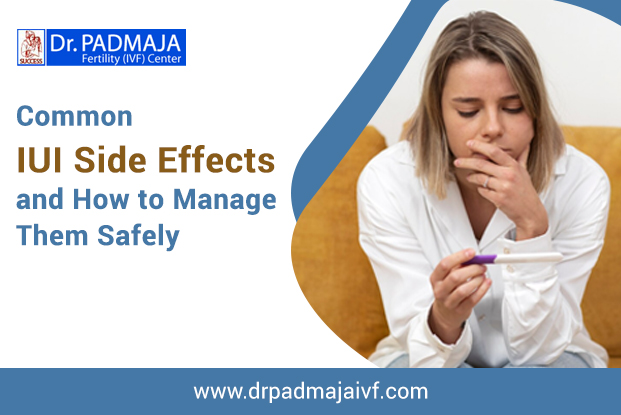Intrauterine Insemination (IUI) is one of the most commonly recommended fertility treatments for couples struggling to conceive. It is a relatively simple and minimally invasive procedure that helps increase the chances of pregnancy by placing washed sperm directly into the uterus around the time of ovulation.
While IUI is considered safe and effective, some women may experience mild side effects after the procedure. Understanding these side effects — and knowing how to manage them safely — can make your fertility journey smoother and more comfortable.
At Dr Padmaja IVF Center, recognized as one of the best IVF centers in Hyderabad, every patient receives complete guidance and care before, during, and after treatment to ensure a positive experience.
1.Mild Cramping or Abdominal Discomfort
It’s quite common to experience mild cramping or a pulling sensation in the lower abdomen after an IUI procedure. This usually occurs because the catheter used during insemination can cause temporary irritation in the uterus.
How to Manage It:
Rest for a few hours after the procedure.
Apply a warm compress or heating pad to your lower abdomen to relieve cramps.
Avoid heavy exercise or lifting weights for a day or two.
Drink plenty of water to help reduce bloating or discomfort.
Most women find that these cramps go away within 24 to 48 hours. However, if the pain is intense or persistent, contact your fertility specialist at Dr Padmaja Fertility Center for evaluation.
2.Spotting or Light Bleeding
A small amount of spotting or light bleeding is another common IUI side effect. This typically happens because the catheter may slightly irritate the delicate lining of the cervix.
How to Manage It:
Use a panty liner if necessary, but avoid tampons to prevent infection.
Rest and avoid intercourse for 24 hours after the procedure.
If bleeding becomes heavy or lasts longer than two days, inform your doctor immediately.
Spotting does not affect the success of the treatment and is usually no cause for worry.
3.Mild Bloating and Gas
Some women notice bloating, mild gas, or a feeling of fullness after IUI. This can happen due to hormonal medications taken before the procedure, such as those used for ovulation stimulation.
How to Manage It:
Eat light, healthy meals and avoid processed or salty foods.
Stay hydrated and include fiber-rich foods to prevent constipation.
Engage in gentle walks or light yoga to ease bloating.
If bloating becomes severe or is accompanied by sharp pain, it may be a sign of Ovarian Hyperstimulation Syndrome (OHSS) — though rare in IUI cycles, it’s important to report such symptoms to your fertility doctor right away.
4.Mood Swings and Emotional Changes
Hormonal medications used during IUI can cause emotional fluctuations similar to those experienced during PMS. You may feel more anxious, irritable, or emotional than usual.
How to Manage It:
Engage in relaxation exercises such as journaling, deep breathing, or meditation.
Talk to your partner or close friends about your feelings — emotional support helps.
Get enough sleep and maintain a balanced diet.
Consider joining a fertility support group for emotional comfort.
At Dr Padmaja IVF Center, patients receive compassionate counseling and emotional
support throughout their treatment journey because mental health plays a crucial role in fertility success.
5.Breast Tenderness
Breast tenderness is often caused by hormonal changes induced by fertility medications or early pregnancy. It may have a similar sensation to breast pain before menstruation.
How to Manage It:
Wear a comfortable, supportive bra.
Avoid caffeine, as it can worsen tenderness.
Use a warm compress to ease soreness.
Tenderness generally subsides after a few days or once hormone levels stabilize.
6. Fatigue and Tiredness
Many women report feeling more tired than usual after IUI, mainly due to hormonal changes, emotional stress, and the body’s response to fertility medications.
How to Manage It:
Prioritize rest and sleep for at least 7–8 hours daily.
Eat nutritious foods that boost energy, such as fruits, vegetables, and whole grains.
Limit caffeine and alcohol intake.
Listen to your body — rest when you feel tired.
At Dr Padmaja Fertility Center, doctors advise patients to follow a relaxed routine after IUI, avoiding unnecessary stress or overexertion.
7. Infection (Rare but Possible)
Although rare, there’s a slight risk of infection after IUI if proper hygiene is not maintained during or after the procedure. Symptoms may include fever, pelvic pain, or unusual vaginal discharge.
How to Manage It:
Always follow your doctor’s post-procedure instructions carefully.
Avoid swimming, douching, or using tampons immediately after IUI.
Contact your fertility specialist right away if you notice signs of infection.
At the best IVF center in Hyderabad, all procedures are performed under sterile and safe conditions to minimize any infection risk.
When to Contact Your Doctor
While most IUI side effects are mild and temporary, you should immediately contact your fertility doctor if you experience:
Severe abdominal pain
Heavy bleeding
High fever
Dizziness or fainting
Difficulty breathing
Prompt medical attention ensures any potential complications are addressed early and safely.
Final Thoughts
IUI is a hopeful step for couples seeking to conceive naturally with a little medical assistance. While side effects are usually mild and short-lived, understanding them helps you feel prepared and confident throughout your journey.
At Dr Padmaja IVF Center, one of the best IVF centers in Hyderabad, patients receive expert care from start to finish. From personalized treatment plans to post-procedure guidance, Dr Padmaja Fertility Center ensures every couple experiences a safe, supportive, and successful fertility journey.
About the Author

This blog is penned by a devoted content specialist passionate about raising awareness around fertility treatments and emotional well- being. With in- depth disquisition on motifs like IVF and fertility, the thing is to give precious perceptivity for couples on their trip to parenthood.
Frequently Asked Questions (FAQs)
1.What are the common side effects after an IUI procedure?
After an IUI (Intrauterine Insemination), you may experience mild cramping, light spotting, bloating, or a feeling of fullness. These side effects are temporary and usually subside within a few days.
2.Is cramping normal after IUI?
Yes, mild cramping is quite common after the procedure. It happens due to the insertion of the catheter or the uterus reacting to sperm placement. Rest, hydration, and a warm compress can help ease the discomfort.
3.Can I experience spotting after IUI?
Yes, light spotting or a small amount of bleeding can occur, often caused by the catheter touching the cervix. It’s usually nothing to worry about unless bleeding becomes heavy or prolonged.
4.How long do IUI side effects last?
Most side effects last only for 1 to 3 days. If symptoms like pain, bloating, or nausea continue for longer, it’s best to consult your fertility specialist.
5.Is it normal to feel tired or emotional after IUI?
Yes. Hormonal medications used before or after the procedure can cause fatigue, mood swings, or mild emotional ups and downs. Taking proper rest and maintaining a healthy diet can help you feel better.
6.What should I avoid after IUI to stay safe?
Avoid heavy exercise, lifting weights, or high-stress activities for a few days. You can continue your regular routine but take care not to overexert yourself.
7.Can I take painkillers for cramps after IUI?
Yes, you can take mild pain relievers like paracetamol (after consulting your doctor). Avoid using anti-inflammatory drugs like ibuprofen unless recommended by your fertility specialist.

